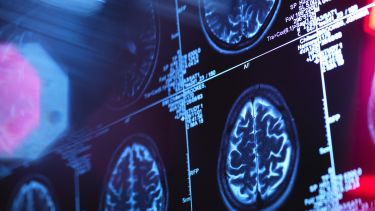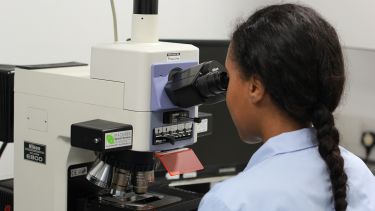Gene Therapy for COL4A1-related disorders
The next generation of medicine for rare diseases

Although individually uncommon, collectively, rare diseases affect a huge number of people - roughly 350-400 million people worldwide, or between 5-10 per cent of the worldãs population. Most rare diseases affect children and many are fatal or severely disabling. There are currently no approved treatments for the majority of these conditions. A new approach is urgently needed to help the patients and families who are in search of better treatments.
However, there is great hope. Medicine is evolving and innovations in gene therapies show outstanding clinical potential for treating rare genetic conditions such as COL4A1-related diseases.
Our ambition is to lead research into a new gene therapy approach for COL4A1. However, funding for research into rare diseases is a challenge. In collaboration with the Brooksã Good Vibes Tribe and other families impacted by this condition, we are raising funds to support this pioneering project. Can you help us?
What is COL4A1?
COL4A1-related disorders are a group of rare genetic conditions that are characterised by ãfragileã blood vessels. The conditions in this group have a range of manifestations including abnormalities of the brain, eye, kidney and blood vessels.
The signs and symptoms can become apparent at almost any age from before birth to old age. Some individuals do not have any observable symptoms whilst others can develop severe, even life-threatening complications. COL4A1-related brain abnormalities typically affect small blood vessels, which causes weakening of these blood vessels and eventually leading to stroke. The type of stroke that occurs is predominately haemorrhagic (caused by leakage of blood from blood vessels) and is often an early indication of the disease. Generalised dysfunction of the brain, seizures and migraines are other neurological symptoms.
One of the biggest challenges for this disorder, and for rare diseases generally, is that there are no standardised treatments for affected individuals. Funding is also a major challenge; because rare diseases affect a small number of people relative to cancer or cardiovascular disease for example, they are often considered lower priorities when it comes to allocating research funding.
Gene Therapy - the future for treating rare diseases
Gene therapies represent tremendous potential for patients living with severe and hard to treat genetic diseases. Gene therapy is the introduction of a new gene to a patientãs cell to replace, silence or manipulate the faulty one. The goal of gene therapy is to restore normal function in affected tissues or cells, potentially enabling a patient to live without the need for ongoing treatments. To achieve this, a custom-made virus vector is used to deliver the genetic material into patients' cells.
Our aim is to embark on a new programme of research to explore the possibility of silencing the abnormal COL4A1 gene. COL4A1 is caused by a fault in a gene that normally provides a genetic code to the cells to enable them to make a protein called collagen. This protein is a key component of all cells in the body. We believe that silencing the abnormal COL4A1 gene could lead to the manufacture of normal collagen in cells and will improve symptoms of the condition.
The first stage of this research is to undertake a three year preclinical study to test the proof of concept in the laboratory. If successful, our ambition is to take this forward to clinical trials and pave the way towards a ground-breaking new treatment.
Brooksã Good Vibes Tribe
Brooks Ward, now two years old, was diagnosed shortly after birth. The first sign of COL4A1 for Brooks was in utero at the 20-week ultrasound which showed that his front brain ventricles were slightly more dilated than normal. When he stopped growing and was born early at 37 weeks, doctors further identified a brain bleed, cataracts and ventricular septal defect (VSD) - a defect of the heart. The family knew something wasnãt right and genetic testing was carried out soon after.
Because of the abnormal blood vessels in Brooksã brain, he had a stroke in utero that damaged his brain and caused infantile spasms. He was born with cataracts and is only able to see light at this point. He has a muscle disease (myopathy) that causes muscle weakness and spasms creating much pain for Brooks. The muscle disease paired with the brain structure abnormalities prevent him from developing. Brooks also has kidney abnormalities which cause chronic UTIs and lung abnormalities which weakens his immune system making him sick often. Brooks has more than 100 seizures a day causing constant chaos in his brain. Even simple things like going out as a family poses challenges as Brooks doesnãt tolerate his car seat and screams at the top of his lungs for entire car rides. Sleep is a struggle for all the family because of the seizures and Brooksã increased risk of additional strokes.
Despite all that he has endured, Brooksã smiles and little giggles would melt anyoneãs heart. His strength is inspiring. Brooksã parents, Blair and Dustin, are absolutely fearless in their pursuit of finding new treatments to help him and other families affected by this condition. Together, with family and friends, they have formed the Brooksã Good Vibes Tribe to raise funds towards COL41A research. Blair and Dustin are the reason this project has begun and we are enormously grateful for their support.
Why 91䧣´?
91䧣´ is a world-leader in gene therapy research. We are the first site in the UK delivering both stem cell transplantation for multiple sclerosis and genetic therapies for Motor Neuron Disease (also known as Amyotrophic Lateral Sclerosis in the US) clinical trials. 91䧣´ leads the ARDAT (Accelerating Research & Development for Advanced Therapies) consortium which brings together 34 internationally leading partners across Europe to advance gene and cell therapies.
We are also renowned for our translational neuroscience research through the (SITraN) and the Neuroscience Research Institute. 91䧣´ is home to the only National Institute for Health Research (NIHR) funded Biomedical Research Centre in the UK ã a collaboration between the University and the 91䧣´ Teaching Hospitals NHS Foundation Trust, which is one of the UKãs largest and most successful hospitals within the UK National Health Service (NHS).
A new Gene Therapy Innovation and Manufacturing Centre (GTIMC) is currently being built in 91䧣´ and is part of a pioneering network of Gene Therapy Innovation Hubs in the UK, dedicated to the clinical development of genetic medicines. The GTIMC will manufacture the viral vectors required for gene therapeutics and provide the critical expertise to swiftly move potential new treatments through early phase clinical trials to commercialisation, helping the most innovative research to reach patients.
At 91䧣´, we have all the necessary expertise and facilities to carry out this research in preclinical models of the disease. Once that part of the project is complete, and if successful, we will be in a unique position to start clinical testing, thanks to the GTIMC, which can manufacture the gene therapy treatment in 91䧣´.
How can I help?
We invite you to be a part of this vision, which could influence the future treatment of COL4A1-related disorders and the health outcomes for people affected by them.
Donations will help to fund an outstanding Post-Doctoral Researcher for three years to lead on the preclinical study. Funds raised above and beyond will support the next phase of our research towards clinical trials.
Make a donation directly to the University of 91䧣´ (USA)
- Under Designation - Select ãOtherã from the drop-down list and include the reference ãCOL4A1ã
Make a donation directly to the University of 91䧣´ (UK and RoW)
- Under Designation - Select ãOtherã from the drop-down list and include the reference ãCOL4A1ã
To make a donation via Wire Transfer (US), Check (US), Bank Transfer (UK) or Stocks and Shares, please contact us.
Your project contacts:
Emma Davey - e.davey@sheffield.ac.uk - +44 (0) 787 540 5953
David Meadows - d.meadows@sheffield.ac.uk - +44 (0) 114 222 1073





